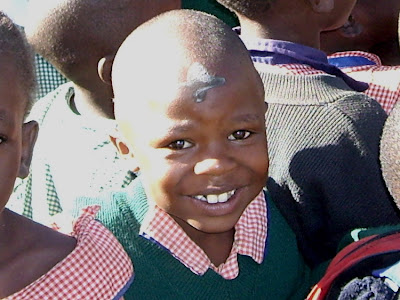Bevan has cerebral palsy and uses the tricycle for play therapy.
I have now been given the position of Volunteer Supervisor at the St. Julie Centre for Disabled Children. It's very strange that I have only been at the Centre about one month and now I am a supervisor. I have never worked with disabled children before, I know almost nothing about physical therapy, and I am not fluent in Swahili. I even have trouble remembering many of the names of the children or even the names of some of my co-workers. I've only been in the country about a month....and did I mention, I'm a supervisor. I'm not quite sure what to think of it. Should I be honored? Frightened? Both?
Work at the Centre has been intense to say the least. I arrive at about 8:30 in the morning and greet David and Angela, the local occupational therapists, but there is usually only time for a brief chat with them before the parents and children start coming in the door.
As they come up the ramp to the Centre I quickly stand from my child-size chair and greet each parent and child with a hand shake, and a "Habari asubuhi!" (Good morning!). Greetings in Kenya, I am told, are very important and I try my best to make a good impression. All are very polite, but some are so surprised to see a mzungu (white person) that appears to speak their local language, that they often can't help but laugh. Many times I also am surprised, but more so by their reaction than I being white, that I will go back and sit down in my chair without asking for the name of their child.

Bridgit has Down's Syndrome and is playing with a doll to help her socialization.
There are now over 100 children that come to the Centre and have disabilities as a result of birth defects, diseases, and also nerve damage due to improperly given injections. Some of the disabilities that are brought into the Center are club foot, cerebral palsy, Down's syndrome, epilepsy, spina bifida, mental retardation, hydrocephalus, microcephalus, and foot drop. Their are also some children that receive transportation to and from the hospital for surgery to correct cleft lip, cleft palette, and various eye conditions.

Samson has spina bifida and kicks a soccer ball for play therapy.
The Centre provides both occupational and play therapy. Occupational Therapy is done by the therapists, David and Angela, and can be a massage or exercise that increases brain and nerve stimulation. The children may also have plaster casts or plastic braces made for their feet and legs to ensure that they will grow straight. The last part of occupational therapy is always a swing in the "hammock" or tire swing to increase balance and stimulate the senses.

Aizan has a speech disability and uses the hammock "tire swing" to stimulate his senses.
It is my job to keep a record of each child's visit and also to update their files for play therapy. I will ask the parent in Swahili, "Jina la mtoto ni nani?" (What is the name of the child?) Then I will record it and see if the child already has a file from a previous visit to the Center. A file includes information about a child's specific disability and can help when choosing a toy for play therapy.

Benjamin is hemiplegic and uses the soccer ball to increase muscle control.
Children that have trouble walking may get a toy that stimulates gross motor control and will be encouraged to use the parallel bars, the push cart, or the tricycle. Those that have trouble using their hands may get a toy that stimulates fine motor control and be encouraged to fit wooden pegs into holes or thread beads on a string. The one's that have problems standing or sitting will be encouraged to use the child safety seats or the standing box. While the one's that have problems with focusing or attention will get a toy that makes noise, play songs, or have flashing lights. Lastly, the children that have problems learning to talk will get a toy that stimulates oral motor control and be encouraged to blow bubbles or play a harmonica.
The children at the Centre can have many varying disabilities. Many can be very active and will run, scream, shout, cry, or laugh. However, there are also many that display very little movement beyond the blinking of their eyes. These children can show very little or no emotion at all. It can be challenging to work with either extreme, but many times, in one day, I will work with both children that are hyper-active and will not sit still and also children that can barely move and are confined to a child seat. Some days can really be a rollercoaster!







 Mandazi (Kenyan donuts)
Mandazi (Kenyan donuts)











 I have since had rat poison put into my ceiling and I have seen my first victim. The poison I am using is called Storm and it's pretty brilliant. When ingested the rats become very thristy and come out of the roof to find water. Shortly after they find themselves "belly-up" outside, and not in my ceiling. Poor buggers!!!
I have since had rat poison put into my ceiling and I have seen my first victim. The poison I am using is called Storm and it's pretty brilliant. When ingested the rats become very thristy and come out of the roof to find water. Shortly after they find themselves "belly-up" outside, and not in my ceiling. Poor buggers!!!